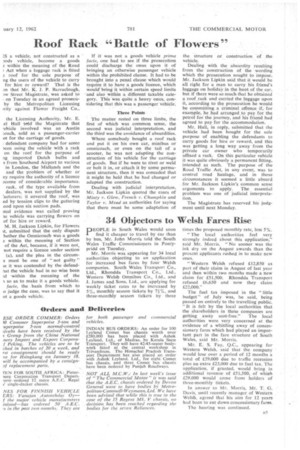Roof Rack "Battle of Flowers"
Page 39

If you've noticed an error in this article please click here to report it so we can fix it.
a vehicle, not constructed as a Jods vehicle, become a goods a within the meaning of the Road Act when a luggage rack is fitted : roof for the sole purpose of ng the users of the vehicle to carry for hire or reward? That is the Dn that Mr. K. J. P. Barraclough, )w Street Magistrate, was asked to on Tuesday in an agreed prosecuby the Metropolitan Licensing oity against Flower Freight Co., the Licensing Authority, Mr. E. el Hall tetldthe Magistrate that 'chicle involved was an Austin :oach, sold as a passenger-carrier ot for the carriage of goods.
defendant company had for some )een using the vehicle with a rack on the roof for the purpose of ag imported Dutch bulbs and s from Southend Airport to various in London, the Midlands and the and the problem of whether or ey require the authority of a licence a.come of considerable importance. rack, of the type available from dealers, was not supplied by the 'acturers; it covered the roof, was ed by tension clips to the guttering ood upon six suction pads.
mal evidence was called proving le vehicle was carrying flowers on of for hire or reward.
M. H. Jackson Lipkin, for Flowers it submitted that the only dispute hether the Omnicoach was a goods a within the meaning of Section of the Act, because, if it were not, not require a licence under section (a), and the plea in the &corns must be one of "not guilty" it was contended by the defendat the vehicle had in no wise been 11 -within the meaning of the so as to make it a goods vehicle. lade, the . basis from which to o judge the case, was to say that R at a goods vehicle. If it was not a goods vehicle prima facie, one had to see if the prosecution could discharge the onus upon it of bringing an otherwise passenger vehicle within the prohibited clause. It had to be brought into a penal clause which would require it to have a goods licence, which Would bring it within certain speed limits and also within a different taxable category. This was quite a heavy Onus, con sidering that this was a passenger vehicle:
Three Points The matter rested on three limbs, the first of which was common sense, the second was judicial interpretation, and the third was the avoidance of absurdities.
Where somebody bought a roof rack and put it on his own car, minibus or omnicciach, or even on the tail of a scooter, be was not adapting the construction of his vehicle for the carriage of goods. But if he were to rivet or weld or bolt it in, or attach it by some permanent structure, then it was conceded that it might be held that he had changed or adapted the construction.
Dealing with judicial interpretation, Mr. Jackson Lipkin quoted the cases of Minty v. Glew, French v. Champ/Lin and Taylor v. Mead as authorities for saying that there must be some adaptation of
the structure or construction of the vehicle. •
Dealing with the absurdity resulting from the construction of the wording which the prosecution sought to impose, Mr. Jackson Lipkin said that it would be all right for a man to carry his friend's luggage on holiday in the boot of the car, but if there were so much that he obtained a roof rack and carried the luggage upon it, according to the prosecution he would be committing a criminal offence if, for• example, he had arranged to pay for the petrol for the journey, and his friend had agreed to pay for the accommodation.
Mr. Hall, in reply, submitted that the vehicle had been bought for the sole purpose of enabling the defendants to carry goods for hire or reward, and this was getting a long way away from the private car owner who temporarily affixed a rack. On this particular vehicle it was quite obviously a permanent fitting, intended as such. The purpose of the Road Traffic Act, in any event, was to control road haulage, and in those circumstances it seemed a little absurd for Mr. Jackson Lipkin's common sense arguments to apply. The essential problem was one of judicial interpretation.
The Magistrate has reserved his judgment until next Monday.








































































































































